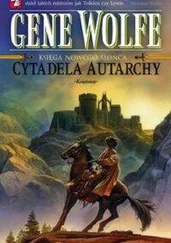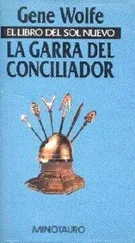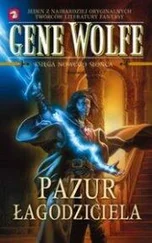Gene Wolfe - Soldier of Sidon
Здесь есть возможность читать онлайн «Gene Wolfe - Soldier of Sidon» весь текст электронной книги совершенно бесплатно (целиком полную версию без сокращений). В некоторых случаях можно слушать аудио, скачать через торрент в формате fb2 и присутствует краткое содержание. Жанр: Фэнтези, на английском языке. Описание произведения, (предисловие) а так же отзывы посетителей доступны на портале библиотеки ЛибКат.
- Название:Soldier of Sidon
- Автор:
- Жанр:
- Год:неизвестен
- ISBN:нет данных
- Рейтинг книги:3 / 5. Голосов: 1
-
Избранное:Добавить в избранное
- Отзывы:
-
Ваша оценка:
- 60
- 1
- 2
- 3
- 4
- 5
Soldier of Sidon: краткое содержание, описание и аннотация
Предлагаем к чтению аннотацию, описание, краткое содержание или предисловие (зависит от того, что написал сам автор книги «Soldier of Sidon»). Если вы не нашли необходимую информацию о книге — напишите в комментариях, мы постараемся отыскать её.
Soldier of Sidon — читать онлайн бесплатно полную книгу (весь текст) целиком
Ниже представлен текст книги, разбитый по страницам. Система сохранения места последней прочитанной страницы, позволяет с удобством читать онлайн бесплатно книгу «Soldier of Sidon», без необходимости каждый раз заново искать на чём Вы остановились. Поставьте закладку, и сможете в любой момент перейти на страницу, на которой закончили чтение.
Интервал:
Закладка:
My senior wife swore that we have spoken like this many times. WHILE I SAT here watching the fires and trying to choose, my slave came to tell me he had entered the temple. It is a good place, he says, though much decayed. There are snakes there, but only a few. I asked why the king wishes me to go there. The senior wife who wishes to leave me said it was because a god had ordered it in a dream. If nothing happens there, will the king blame me for it? I cannot say, and neither could they.
Certainly I put no trust in dreams. I would not like to meet the king singly; he is a skilled warrior, and his men say he is as bold as seven lions. If I took his life, his men would take mine, I feel sure.
I HAVE TRIED the sandals Cheche made. They need no lining, and are stronger than I would have thought possible. Now Myt-ser'eu and I will sleep. VINJARI IS GONE. I have the shield the goddess gave. So much has happened that I despair of writing everything, though Myt-ser'eu and Cheche say I must. So does Myt-ser'eu's servant. I will write the first thing first.
We set out for the temple but had not gone far when a cry came from the back of the column. One of the king's warriors had trodden upon a snake, which bit him. The others killed it, a big brown snake with a head like a viper's. Unguja treated him, sucking the wound and dressing it with salve and the flesh of the dead snake; the bitten warrior soon died just the same. We buried him in the dry watercourse, heaping his grave with stones.
"I have promised you would be safe from us in the temple as long as I was with you, master," my slave whispered.
I said I had forgotten it.
"Of course, master. Yet I spoke as I said. I cannot promise that the others will be. Only you. Even you will not be safe unless I go ahead of you to tell the folk. May I go?"
I thought he merely wanted a respite from the work of piling stones, but I said he might. He left at once, and I did not see him again until the time I will write of.
The temple is stone, very old. Myt-ser'eu said that though she had seen many old things in her own land, it was older than any. Its roof has fallen in places. The king said that only he and I should enter. That was wise, I think, but Unguja pleaded with the king. When the king agreed to take him, he urged that Mzee come with us as well. That too was granted.
The king asked then whether there were any whom I would have with me. Myt-ser'eu wished to go, but I feared for her and took my sons instead. So we six entered the temple, bearing torches and unaware that a seventh would slip away and follow us.
It seemed darker there than any night, for we stepped into darkness from sunlight bright enough to blind a lion. It seemed cool as well after the heat of the day, which had been very great. Bats stirred and squeaked on the false arches above us, and the floor was crusted with their droppings.
Soon I felt a stirring on my chest, as though the gold scarab I wore feared the bats. When I looked down, I saw that it was biting the string that held it. In a moment more the string had parted, and it flew some distance, still gleaming blue and gold in the light of our torches.
Behind me the king called, demanding to know what I was doing. I tried to explain that my scarab had come to life, and flown, and vanished into a crevice in the floor. This was difficult, because I do not speak his tongue well and could not lay hand to many words I required.
"The string broke," the king told me. His voice was kind. "Your scarab fell and rolled into the crevice. Forget it, as you forget so much. You will never see it again."
I asked him to help me lift the stone; he shook his head, backing away. "We must find the god," he said. "That is what is important, Latro-finding the god."
Lifting the stone was difficult, not only because of its weight, but because it was hard to grasp at first. My sons helped, but would not go down the worn steps with me. I went down, walking very slowly because my torch burned badly there. I thought that my scarab (I never found it) must have rolled down the long stair; when I motioned to my sons, they looked frightened and would not follow. So it was that they learned they were only boys, after all.
As I descended I saw that the temple had once been much larger than the part that we had seen. Wind and time had heaped up soil around it; the part we had seen and entered had been an upper story once. There was a small god of black stone, in appearance a man as old as Unguja, in a niche at the landing. I held my torch close to see his face. He was bald, bearded, and smiling, round-bellied. He held a cup and a flute. I felt then as I do when I see the king, felt that he was a better friend than I knew. I touched him, and he moved at my touch. When I lifted him from the niche in which he stood, I saw that there was an opening behind him and a scroll smaller than this one in the opening.
I took it out; and as I replaced the image of the happy old god, I heard the voice of my senior wife, Myt-ser'eu, behind me. I turned at once, almost dropping the scroll he had given me.
She stood on the stair. Behind her was a man blacker than the king, not the small and friendly god whose image I had moved, but a tall man with the look of a warrior who kills the wounded. His hands were on her shoulders, and there was a thing in her face I cannot put into words. She might have been dreaming (though her eyes were very wide) and frightened by her dream. "You must give it to Sahuset," she told me. "Don't you remember? You promised to give it to Sahuset."
I did not remember, nor do I know who Sahuset may be.
"You promised him. Swore that you would give it to him."
I tried to untie the cords, for I wished to see whether I could read it. There was no knot.
"You must not open it," Myt-ser'eu told me.
I was afraid for her. I would have cast my spear at the black man behind her if he had stood alone; I felt I could not throw without killing her, for he would lift her to receive it. "I love you," I said; I knew it was true, and that she did not know it.
"If you open it," she told me, "you will never find your shield."
I saw it was important to her and said I would not. The truth is that I could not. The leather case that carries this scroll was slung on my back, as I would think it always must be on the march. I opened that instead, and put the scroll I had found into it. It is a smaller scroll than this, tightly wound.
I stopped just now to look at it again, but did not cut its cords. It is not mine to open, or so I feel.
When I had fastened the straps of my scroll case, the tall man who had held Myt-ser'eu was gone. I asked her who he had been; she said there had been no such man.
"A tall, hard-faced man," I said, "darker than your eyes. His own seemed to burn."
"I've seen many men like that here," Myt-ser'eu replied. "There are dozens like that with us. Did you mean it? What you said when I was on the steps above you?"
I nodded and she kissed me. I held her close, delighting in the breasts she pressed so tightly to me. How small she is! How sweet and good!
We descended the second stair to the bottom hand in hand, and searched for the inner room in which the god would stand. I knew it was what we must find, because the king had said it, and because Myt-ser'eu did not seem to understand me when I asked about the shield she had said only a moment before that I had lost. "I suppose I must have owned a shield once," I said, "but I don't recall it."
"You recall very little," she told me. "When you fought Cheche's brother-in-law you won his shield, but you did not like it. It was too big, you said, and not strong enough. The king did not want you to have it, either. You left it behind in Cheche's village."
If there were pictures on the walls of that temple once, the passing years had worn them away. We saw only bare stones, somewhat rough, somewhat soiled, and strangely fitted. Windows had spilled sand and shale onto the floor, and here and there a wall bulged and seemed about to fall. Once I heard a thrumming ahead of us, as if a beetle flew through the darkness there; and once I saw a faint gleam that might have been gold, though there was no gold there when I went to look where it had been.
Читать дальшеИнтервал:
Закладка:
Похожие книги на «Soldier of Sidon»
Представляем Вашему вниманию похожие книги на «Soldier of Sidon» списком для выбора. Мы отобрали схожую по названию и смыслу литературу в надежде предоставить читателям больше вариантов отыскать новые, интересные, ещё непрочитанные произведения.
Обсуждение, отзывы о книге «Soldier of Sidon» и просто собственные мнения читателей. Оставьте ваши комментарии, напишите, что Вы думаете о произведении, его смысле или главных героях. Укажите что конкретно понравилось, а что нет, и почему Вы так считаете.










